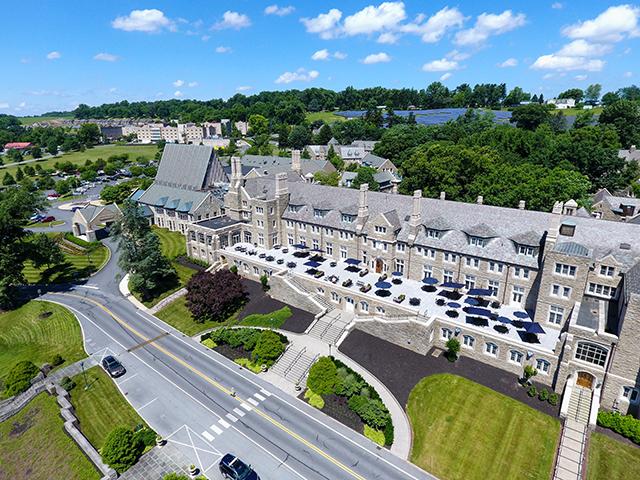Rural Retirement Community
Farm Life Always
In the early 1900s, when members of the Grand Lodge of Pennsylvania chose a site for a retirement home, fertile soil was one of the main requirements. While that might seem odd, their intention was to make Masonic Villages self-sustaining.
Today, the Elizabethtown complex includes a beef herd, an orchard and plenty of bees across 1,400 acres. And, make no mistake, they all help to sustain the residents here. In fact, the cows are a daily topic of conversation for many residents.
"If you saw how many pictures there are of cows on my phone," laughs Sandra DePue, a resident since 2018.
"Sandra is our resident cow photographer," says Debra Davis, public relations manager for Masonic Villages.
DePue, a former fashion designer, uses the photos as references for her artwork. Every year, she sells them at a local fair, and she says the cow paintings are the first to go.
Even when she isn't photographing them, DePue still enjoys the cattle. "The cows are moved pasture to pasture, and the pastures are beautiful," she shares. "I love that I can hear the cows mooing here."
For Frank Miller, memories of the family dairy and time spent with his grandfather brought him to live at Masonic Villages. He and wife, Linda, moved here in 2018.
"When we selected the cottage, we chose one where we could sit on the front porch and see the house where my grandparents lived," he says of the property. Miller's grandfather, Harry Geyer, was assistant dairy manager when this complex included a dairy herd. He did a number of jobs, including taking care of the milk cows, looking after the calves and working in the creamery. Miller spent many summer days with his grandparents and still recalls how the calves were his favorite because they would come over and love on him.
Miller's mother, Erma, also worked at the dairy as a teenager. From her office in the root cellar, she kept records on the purebred Ayrshire herd.
P[L1] D[0x0] M[300x250] OOP[F] ADUNIT[] T[]
Over the years, the creamery was converted to office space, and the milk barn became a maintenance facility; but the memories remain.
"Being here is nice. It is not a metropolitan area, and you can relax," Miller says. "It is fun watching the calves run around with their mothers." Miller still works part time as a funeral director and serves as unofficial historian for Masonic Villages.
PEACE AND WELL-BEING
Jess Lee, clinical psychologist at Masonic Villages, isn't surprised the farm contributes to residents' well-being.
"The campus promotes an appreciation for nature and beauty, which can positively impact mood and enhances relaxation," she explains.
For Scotty Miller (no relation to Frank), his job as manager of the 500-acre Masonic Villages farm doesn't exactly promote relaxation, but it does provide an opportunity to showcase his passion.
"When a resident stops me with a question, it's a great chance for education. We can explain how the cattle benefit all of us," he says, adding, "I love what I do."
He also welcomes a little extra supervision over the 150-head cow herd, mostly Angus and SimAngus.
"We have over 1,970 residents, so that's 1,970 extra pairs of eyes," he laughs. The complex also has a security team that constantly patrols the area and helps alert Miller of the occasional escaped weanling.
Miller's responsibilities include overseeing the herd. During the growing season, the cattle are rotated from pasture to pasture as often as every four days. That gives the orchardgrass and bluegrass a chance to rest and recover. After cattle are moved, pastures are clipped to remove any overmature grass and to check for bare spots or problem weeds.
"We like to say green grass and blue skies make red meat," Miller says. "That's the ultimate upcycling."
During the winter, when grass isn't growing, Miller grazes cows on cornstalks left over from the silage and field corn crops, or on cover crops. When the winter cover crops stop growing, Miller moves cows to one or two sacrifice paddocks, where they calve and are supplied with hay. Once the 60-day calving season is over, and the grass starts to green up again, they go back on a rotation.
For the environment's sake, as well as to supply the cattle with clean water, they're fenced out of springs and the pond. Gravity-flow water systems pipe water to concrete troughs.
Grass alleyways and terraces help prevent erosion, as do no-till planting and the use of cover crops.
"The no-till and cover crops keep down the weeds, so we use less chemicals," Miller explains. "That's better for the pocketbook, the environment and the residents."
STEWARDSHIP, BQA AWARDS
In 2011, under the direction of farm manager Frank Stoltzfus (now retired), these efforts earned the Masonic Villages farm the regional and national Environmental Stewardship award, presented at the National Cattlemen's Beef Association meeting. In 2016, the same year Miller took over, the cattle enterprise won the national Beef Quality Assurance (BQA) award.
"We take BQA seriously," Miller says. "We handle the cattle how they should be handled. Low-stress cattle-handling is always in the front of our minds."
BQA also includes using calving-ease bulls. Miller says, "I want what is best for the animal. If I don't take care of the animal, it won't take care of me."
There is one more perk to having a cattle farm in the middle of a retirement community: While most of the Choice and Prime grade beef from the feedlot goes to Happy Valley Meat Co., in New York, occasionally it's used in the Masonic Villages restaurants.
"The days they serve filet are really good days," Frank Miller says.
[PF_0323]
(c) Copyright 2023 DTN, LLC. All rights reserved.




